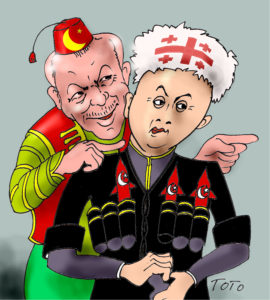By Edmond Y. Azadian
This is not the first time Georgia is living up to its title of “friendly foe” with Armenia. Although the cross is prominently featured on the Georgian national flag, Christian brotherhood does not mean much to the Georgian government. Otherwise, some consideration and solidarity would have been warranted between the only two Christian nations amidst an ocean of Islamic countries.
During the Soviet period, all ethnic tensions were subdued by the central government although there was no love lost between Armenia and Georgia, since the two had fought a war before being integrated into the Soviet empire. As a result of that war, the historic Armenian region of Javakhk was integrated into Georgia.
After the collapse of the Soviet empire, the two emerging republics politically developed in opposing directions, pushing their simmering mutual antagonism into political dimensions.
By historic necessity, Armenia aligned itself with Russia, becoming a strategic ally of its northern neighbor and hosting Moscow’s military base on its territory. Georgia, meanwhile, veered towards the West, entertaining its dream of becoming a NATO member. Although the Tbilisi government suffered for its Western orientation as a result of President Mikhail Saakashvili’s reckless politics, the succeeding government of the Georgian Dream Party did not alter the nation’s foreign policy.










